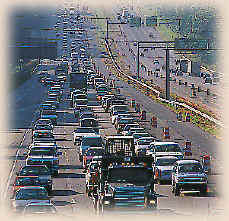|
Transportation Planning And Funding
 Position: NCCB1 supports
immediate attention to multi-modal, long-range transportation Planning
that recognizes the value of our highway system, rail system,
airports, seaports, and transit systems and their contributions toward
business success, economic growth, and recruitment of now industry.
Planning should recognize the continuing benefits and needs of
existing transportation systems, and the need to develop appropriate
inter-modal systems. A critical evaluation is needed of highway fund
transfers to other State agencies. Planning should also include a
visionary look at the need for additional dedicated funding sources
necessary to assist the growth and maintenance of our infrastructure
into the next millennium. NCCBI pledges to work with the newly formed
Blue Ribbon Transportation Finance Study Commission as it studies
transportation finance issues. Specific dedicated funding sources
should be evaluated for the following areas of infrastructure:
Position: NCCB1 supports
immediate attention to multi-modal, long-range transportation Planning
that recognizes the value of our highway system, rail system,
airports, seaports, and transit systems and their contributions toward
business success, economic growth, and recruitment of now industry.
Planning should recognize the continuing benefits and needs of
existing transportation systems, and the need to develop appropriate
inter-modal systems. A critical evaluation is needed of highway fund
transfers to other State agencies. Planning should also include a
visionary look at the need for additional dedicated funding sources
necessary to assist the growth and maintenance of our infrastructure
into the next millennium. NCCBI pledges to work with the newly formed
Blue Ribbon Transportation Finance Study Commission as it studies
transportation finance issues. Specific dedicated funding sources
should be evaluated for the following areas of infrastructure:
·
Maintain our current
infrastructure at cost-effective levels to provide an adequate level
of service to the traveling public.
·
Develop, as growth and
economic viability allow, mass transit systems, including bus, and
rail, focused in critically congested urban areas where the highest
potential to achieve sufficient ridership exists to provide a
significant reduction in vehicle congestion.
·
Implement the approved NC-DOT
Transportation Improvement Program at a schedule that will 1)
adequately address current overly-congested corridors, 2) allow
corridors to develop that are needed for economic growth, and 3)
maintain the level of mobility necessary for our citizens. Recognize
that funds are needed for both congestion mitigation as well as
economic development and growth in less developed areas. These needs
should not be mutually exclusive or in competition with each other;
both nm<W arc legitimate. Both needs are underprogrammed,
under-funded, and, without attention, will deter our state from
providing the quality of life, climate for responsible growth, and
environmental atmosphere desired by our citizens.
Explanation: North Carolina
has traditionally enjoyed a transportation system providing
cost-effective, convenient, flexible and efficient movement of people,
goods and services throughout the state. The quality of the system is
approaching a marginal condition. Improvement of this transportation
system is essential to our economic future.
Historically, the traveling
public has placed almost total reliance on the automobile as its
preferred mode of surface transportation. in most urban and rural
areas of North Carolina with dispersed population and work centers,
the automobile will continue to dominate as a travel mode. Where
population density and common travel patterns exist and potential
ridership warrants, other forms of public transportation should be
considered. Corridors and right-of-way are best set aside early in the
process, In many cases, existing rail corridors may provide the best
route and should be preserved for possible future use.
Planning activities should
recognize traditional and alternate sources of transportation funding,
and capitalize on funding programs of most benefit to North Carolina.
The end result of transportation planning and development should be a
seamless multi-modal system for people and freight.
|
If you have comments on any of the NCCBI positions
or other issues,
please
click here for a feedback form |
-
Highway Maintenance
Funding
-
North Carolina State Ports
-
Rail Infrastructure
-
Coordination Among
Regulatory Agencies
-
Motor Vehicle Safety
Inspections
|

